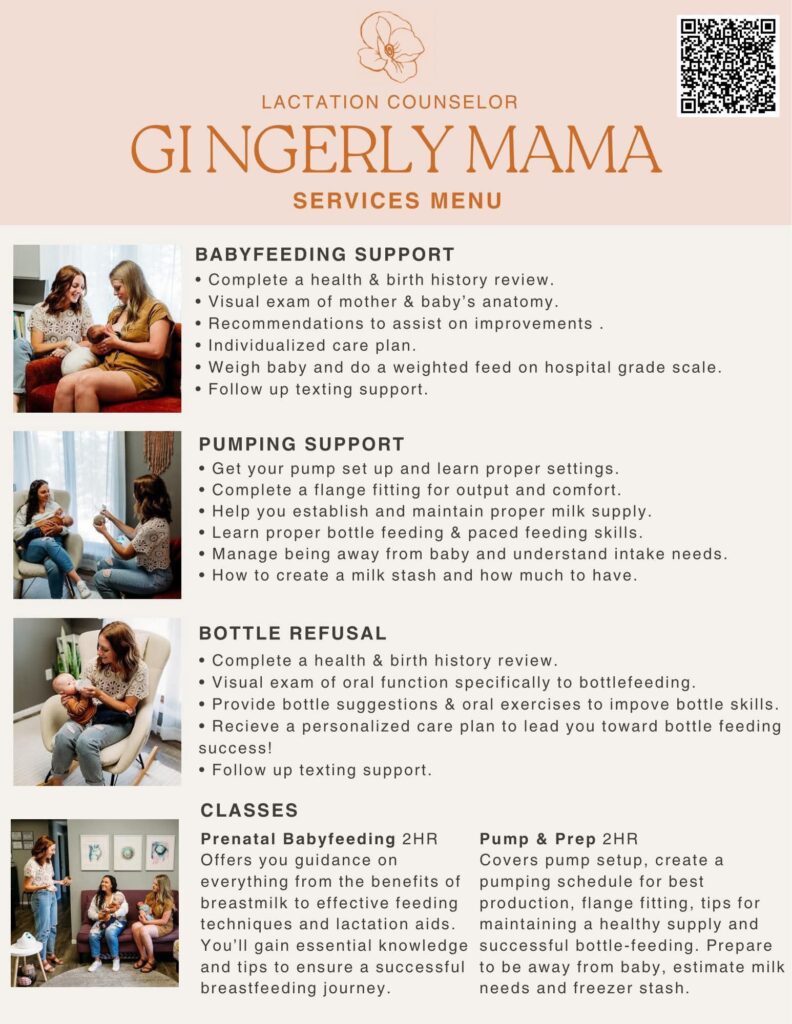Lactation consultant Quad Cities – if you’ve searched that phrase while struggling with breastfeeding, you’re not alone. Feeling overwhelmed as a new mom can be difficult. You know how important it is to have someone truly supportive in your corner. Many families looking for a lactation consultant decide to turn to Kenzie at Gingerly Mama. They seek help, encouragement, and compassionate care. She is a lactation counselor and a doula in the Quad Cities. She brings a calm, caring presence to every family she supports. She also provides a wealth of knowledge. Breastfeeding can be way more challenging than most of us expect. Having Kenzie there to walk with you—without judgment and with so much compassion—makes all the difference. She’s not just a professional and genuinely wants to help moms feel confident. She ensures they feel supported and never alone in their journey.
This interview with Kenzie is full of honest insight, helpful tips, and real encouragement that every mom deserves to hear.
1. What led you to become a lactation counselor, and how do you support moms looking for a lactation consultant in the Quad Cities?
Breastfeeding difficulties with my first daughter were what initially sparked my interest in lactation counseling. At the time, there were very limited support options in our area. I found myself leaning heavily on a new neighbor—someone who eventually became a very close friend. With her encouragement and support, I was able to push through some of the hardest moments. Over time, I grew to absolutely love breastfeeding and the deep bond it created between my daughter and me. Looking back, I’m incredibly grateful I stuck with it, but I also remember wishing there had been better, more accessible support for moms in our community. That experience is a big part of what motivates me to help other families now.
-I bring a practical, hands-off approach to breastfeeding support. My goal is to teach moms skills they can confidently use on their own, even after our time together ends. I extend my care beyond appointments with a couple weeks of texting support to ensure things are going well, questions are answered, and progress continues. That way, each visit builds on the last—we’re not starting from scratch, we’re moving forward together.
2. What are the key services you offer to mothers who are experiencing challenges with breastfeeding?

3. Can you tell us a little bit about you?
I’m deeply passionate about supporting women in our community and helping them reach their birth and breastfeeding goals. I was born and raised in the QC. I left for college at UNI. I spent a few years living in the Twin Cities, which is my home away from home. Eventually, I found my way back here. My husband, Jordan, and I have been married for nine years. Together, we’re raising three wild and wonderful little girls. Our dog, Pieper, keeps the girl gang going strong!
Lazy weekend mornings with my family and a cup of coffee in hand are my happy place. I have a soft spot for terrible reality TV. I love all things organized, though that’s a daily challenge with three kids. I also have a serious weakness for dessert, coffee, and the occasional brewery outing. I’m currently on a surrogacy journey. This is something very close to my heart. It’s another way I hope to support and empower families.
4. Where do you typically meet with mothers for lactation consultations? Do you offer in-home visits, office appointments, or virtual sessions?
My main office is located at Motherhood Matters in Davenport. I also offer home visits for families who prefer that option. This is especially true for babies under two weeks old, which I recommend! I’m also happy to provide virtual sessions or classes for those who find that more convenient or comfortable. I try to meet families where they’re at, both literally and figuratively!
5. Does insurance cover any of your lactation counseling services? If so, what should clients know about utilizing their benefits?
I don’t currently submit directly to insurance. I’m happy to provide a superbill that clients can use to seek reimbursement. Clients can also apply it toward HSA/FSA funds. Unfortunately, insurance often only covers minimal support, which can limit the care I’m able to provide. By operating independently, I’m able to offer the comprehensive, personalized support that families truly need and deserve.
6. What should a new mom do if she’s struggling with breastfeeding and unsure where to turn for help?
If you’re struggling with breastfeeding, you’re not alone—and there’s help. Reach out to a lactation counselor early. We’re here to support you with latch issues, milk supply, or pain. We can also offer reassurance. You can also ask a local support group like le leche league. Needing help is part of the journey, not a sign of failure!
7. How soon after giving birth should a new mom reach out to a lactation counselor for support?
Ideally, a new mom should reach out to a lactation counselor as soon as possible after birth—or even before! I offer prenatal appointments especially for moms who’ve had tough past breastfeeding experiences and want a different start this time. For first-time moms, I also offer prenatal classes to lay the groundwork and build confidence. Early support makes a big difference, and there’s no such thing as reaching out too soon.
8. What can a mom do if she feels like she’s not producing enough milk? How can you help with that?
If a mom feels like she’s not producing enough milk, the first step is not to panic—it’s a common concern. I can help by looking at how baby is feeding. I will check for a good latch. I’ll determine if the baby is getting enough milk. We can also do a weighted feed to measure how much milk baby is transferring. If needed, we’ll go over simple ways to boost supply—like nursing more often, new pumping styles, or trying certain foods. I offer support, guidance, and a plan that’s specific to you and your baby. You’re not alone in this!
9. If a mom experiences pain while breastfeeding, how do you help her find the cause and alleviate the discomfort?
If a mom is feeling pain while breastfeeding, we start by looking at baby’s latch. We also examine positioning. Those are often the key factors. I watch a full feed to spot anything that causes discomfort. This includes shallow latch, tongue or lip ties, or tension in the baby’s body. Once we find the cause, I help make small changes that can bring big relief. My goal is to make feeding comfortable and work for both of you.
10. How can you help a mother in establishing a good breastfeeding routine?
I help moms create a breastfeeding routine that fits their baby’s natural rhythms and their own lifestyle. We look at feeding cues, frequency, and how to make nursing feel manageable—not overwhelming. Sometimes we do work during the day and survive at night, just to make things sustainable. I offer guidance on what’s normal, how to build supply, and how to adjust as baby grows. It’s all about finding a rhythm that works for your family.
11. For moms returning to work and looking to continue breastfeeding, what steps do you recommend to make that transition easier?
For moms heading back to work, I help create a plan that supports both pumping and keeping up milk supply. We talk about building a freezer stash, choosing the right pump, and creating a realistic pumping schedule. We also work on setting up good routines with daycare providers. This includes paced bottle feeding. We make sure moms don’t go too long between milk removals. The goal is to keep breastfeeding going in a way that works for your new routine—and feel confident doing it.
12. If a mom is considering pumping, what advice do you give?
When should a mom introduce it into the breastfeeding routine? If a mom is thinking about pumping, I help her figure out the right time to start based on her goals and baby’s feeding. Often, we wait until breastfeeding is well established. However, it’s important to introduce pumping by 4-6 weeks if baby will need to take a bottle. I guide moms on how often to pump. I also guide them on how to store milk. Additionally, I help them make pumping fit into daily life. Whether it’s for flexibility, work, or just having a break—I help make it simple and sustainable.
13. What advice do you have for dads or partners who want to support breastfeeding moms?
For dads or partners wanting to support breastfeeding moms, I recommend being actively involved in the process. Offer emotional support by cheering them on, helping with positioning, or keeping them hydrated. They can also help with household tasks to allow mom to rest or focus on feeding. If pumping is part of the plan, they can help with bottle feeding or managing the milk stash. It’s about being a team and showing that breastfeeding is a shared journey.

14. How can you help a mother who is dealing with common issues like clogged ducts or mastitis? What preventive measures can be taken?
If a mom is dealing with clogged ducts or mastitis, I help her identify the root cause. This helps to prevent these issues from reoccurring. Key strategies include using ice to reduce inflammation. Gently massage towards the armpit to encourage lymphatic drainage. Continue to nurse or pump as usual. Staying on top of reducing inflammation is crucial for recovery and prevention.
15. For moms experiencing a decrease in milk supply, how do you help them troubleshoot and boost production?
This one is similar to one above.
16. What follow-up support do you offer after an initial consultation? How do you ensure the mom feels confident and supported in her breastfeeding journey?
After our initial consultation, I offer two weeks of texting support. I follow up every three days if I don’t hear from you. This helps me stay updated on what’s working and what isn’t, so we can continue making progress even between meetings. Typically, we check in again after 1-2 weeks to make sure you’re feeling confident and supported throughout your breastfeeding journey.
17. How do you work with moms who have had negative experiences with breastfeeding in the past? How do you help them to try again or navigate new challenges?
For moms who’ve had negative experiences with breastfeeding in the past, I work with them to understand what happened. I help them find ways to prevent those challenges this time. We focus on being proactive—looking for ways to prepare ahead of time and tackle potential issues before they arise. I also check in often to make adjustments as needed, so changes happen faster.
18. Are there any common myths about breastfeeding that you would like to debunk?
Yes, there are several common myths about breastfeeding that I’d love to debunk! One myth is the idea that if you don’t feel full, your milk supply is low. Often, the supply is just fine. Your body adjusts to what the baby needs. Another myth is that breastfeeding has to hurt for it to be effective. Pain is usually a sign of a latch issue. It’s not something you just have to “push through.” Lastly, many think that breastfeeding needs to be on a strict schedule. But, babies often thrive on feeding whenever they’re hungry. Their feeding does not need to be by the clock. My goal is to help moms feel confident by understanding what’s truly normal and healthy.
19. How do you help moms who feel overwhelmed by the demands of breastfeeding and need emotional or psychological support?
For moms feeling overwhelmed by the demands of breastfeeding, I remind them that their health is paramount. A mom’s well-being is essential for her child’s health. It’s perfectly okay to seek support. If breastfeeding feels difficult, we might focus on building new skills during the day. Then, we can shift to pumping and bottle feeding overnight to give mom a break. If sleep is a priority, we work on getting a solid 4-hour stretch at night. This way, she wakes feeling rested. She will be ready to try again. It’s all about finding balance. We aim to ensure mom feels supported. This way, she can continue caring for herself and her baby.
20. What advice would you give to a first-time mom beginning her breastfeeding journey? How can she be best prepared?
My best advice for a first-time mom starting her breastfeeding journey is to find support from someone you trust before baby even arrives. Education is key. The more you learn and prepare ahead of time, the easier it will be when challenges arise. Also, having your partner’s support is invaluable—it helps make the experience smoother and more manageable for both of you. Building a strong support system is one of the best ways to set yourself up for success!
21. What are some of the most important things to remember when breastfeeding in the early days?
One of the most important things to remember in the early days of breastfeeding is that this is just a season—it will pass. Things change quickly, and what feels hard now won’t last forever. Take it one day at a time, give yourself grace, and know that improvement often comes faster than you think. You’re learning, baby’s learning, and with time and support, it will get easier.
22. How do you help moms who are feeling discouraged or frustrated with breastfeeding?
When a mom is feeling discouraged or frustrated with breastfeeding, I start by listening—really listening—to what’s been hard for her. Then we work together to find the root of the problem and come up with simple, realistic steps forward. I remind her that she’s not alone, and it’s okay to feel how she’s feeling. Everyone’s journey is different, and it doesn’t need to be all one way or nothing. Sometimes we do both—breast and bottle, or combo feeding. There are options, and my goal is to help her feel supported, encouraged, and confident again—one step at a time.
23. How can a mom tell if her baby is getting enough milk during breastfeeding?
To know if a baby is getting enough milk, we look at a few key signs. One is listening for swallows during feeding—this tells us milk is being transferred. Another big clue is diaper output. What goes in must come out. Plenty of wet and dirty diapers usually means baby is getting enough. Baby’s overall demeanor—whether they seem content after feeds and are gaining weight—is also important. If there’s still uncertainty, we can replace a feeding with pumping. Alternatively, we can do a weighted feed. This helps us get a better sense of how much milk the baby is taking in. All of these pieces together help paint the full picture.
24. What support do you offer to moms who need help with breastfeeding? How do you assist when they are managing a health condition, like postpartum depression or anxiety?
When a mom is navigating breastfeeding, my support takes a more holistic approach. She may also be managing a health condition like postpartum depression or anxiety. My approach turns gentler to accommodate her unique needs. I take the time to understand her full situation. This includes her emotional, physical, and medical state. This understanding makes the care plan feel doable. It aims not to be overwhelming. I offer two weeks of texting support after our session. I give regular check-ins. I create a clear, customized care plan that includes small, manageable steps. I also collaborate with her mental health provider if needed, and always affirm how she’s feeling. The goal is to support her feeding goals and her mental well-being, without adding pressure or guilt. It’s about meeting her where she is and walking with her through it.
25. What’s the first thing you do when you meet a new mom seeking breastfeeding support?
The first thing I do is listen. I want to hear her story—what’s been happening, what she’s feeling, and what her goals are. Every mom’s experience is so unique, and I never assume what she needs before she’s had a chance to share. From there, I offer reassurance and start identifying where we can make small, effective changes. My goal is to create a safe space where she feels seen, supported, and encouraged, right from the start.

26. Can you describe a time when you helped a mom achieve her breastfeeding goals?
One of my favorite stories—one that still gives me goosebumps—involved a mom who truly had the odds stacked against her. Her baby wasn’t latching, she absolutely hated pumping, and she was emotionally and physically drained. She told me more than once that she didn’t think it would work. But she still showed up. So did I. Together, we found a middle ground. We discovered a way to keep her milk supply going without pushing her too far. At the same time, we gently worked on baby’s latch and milk transfer.
In these situations, I always say it takes a “handholding village.” I often collaborate with other providers. They include bodyworkers, oral function specialists, or chiropractors. When we all support a family in our own unique ways, the results can be incredible. This mom stuck with the process, even when it felt impossible. And in the end, her baby breastfed full-time for over a year. She got the experience she had longed for but missed with her first child—and she was over-the-moon proud of herself.
Those are the moments that remind me why I do this work. It’s not about perfection—it’s about perseverance, trust, and walking with families through the hard parts until they reach something beautiful.
27. How do you work with moms who need to return to work but want to continue breastfeeding?
I love helping moms navigate that transition. Returning to work doesn’t have to mean the end of breastfeeding—it just means we need a solid plan. I offer a Pump & Prep class. It is designed specifically to prepare for this shift. The class covers everything from choosing the right pump and setting up a pumping routine. It also includes milk storage and maintaining supply. I also help create a personalized plan that fits her workday and support system. Beyond the logistics, I’m there emotionally too, because this can be a big adjustment. We keep breastfeeding sustainable, meaningful, and flexible, with plenty of follow-up and encouragement along the way.
If you’ve been searching for a lactation consultant Quad Cities, Gingerly Mama is a wonderful place to start your journey. Kenzie offers compassionate, knowledgeable breastfeeding support that empowers moms to feel confident and cared for. Through her work as a lactation counselor and doula, she provides one-on-one guidance. She also offers encouragement and follow-up. This is what so many families need in those early days. Whether you’re facing feeding challenges, she is someone you’ll be grateful to have in your corner. If you just want someone to walk alongside you with experience and heart, Kenzie is there for you. Her support is a beautiful reminder that you don’t have to do this alone.
Ready to feel supported in your breastfeeding journey?
Want to learn more or connect with Kenzie?
You can visit her website to explore her lactation counseling services in the Quad Cities, follow her on Instagram @gingerly.mama. You can also check out her newest venture, @qcdoulaconnect. It is a growing resource for pregnancy, birth, and postpartum support in the QC area.
P.S. If you’re welcoming a little one soon, I’d love to be part of your story. Let me help you document those precious early days. I offer newborn, Fresh 48, milestones, cake smash, in-home and family sessions for families across the Quad Cities.
Visit Little Hauflings Photography to learn more. You can also reach out, I’m here to help you capture these moments before they slip away.
Thank you so much for your interest in hiring me as your Quad City Photographer. My time is limited each month so it's never to early to inquire. I look forward to chatting with you!
Say Hello & Let's Connect!
Let's document you special moments
